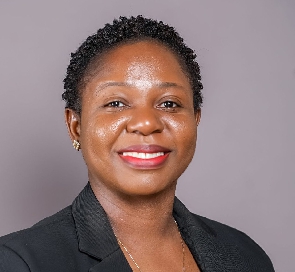The Minister of Health Kweku Agyeman Manu has said the quest to achieve universal health coverage can only be driven by research into health delivery, quality healthcare and access.
He has therefore charged policymakers, healthcare providers and academics in the health sector to utilize research data to formulate and implement effective healthcare policies to help fast-track the country's attainment of universal health coverage UHC.
According to the World Bank, Universal health coverage (UHC) is about ensuring that people have access to the health care they need without suffering financial hardship.
Data from PharmAccess Foundation however shows that 43% of the African population still lacks access to basic health care while about 11 million people are driven into poverty every year due to spending household income to access basic health care.
In its attempt to change this, PharmAccess Foundation organized a maiden symposium aimed at helping bridge the gap between health research and policy formulation for healthcare.
The one-day conference which was under the theme, "Facing the facts for UHC, can research drive policy from innovation in health financing and delivery in Ghana; explored ways of leveraging technology to improve health care delivery across Africa.
In attendance were officials from the Ministry of Health, the National Health Insurance Authority NHIA, the Norwegian and Netherlands embassies, and pharmaceutical companies among others.
Speaking via a video conferencing, the Director of Research, at PharmAccess Foundation Professor Global Health, University of Amsterdam Prof. Tobias Rinke de Wit emphasized the need for factoring independent research findings into innovative ways of making healthcare accessible to all especially those in remote communities. According to her, PharmAccess Foundation is earnestly enhancing the capacities of young researchers across Africa to help generate useful data in developing effective policies to accelerate the attainment of Universal Health Coverage UHC.
"PharmAccess Foundation is building capacity for young researchers across Africa to help inform and guide policy formulation in innovative healthcare financing."
Speaking at the opening of the conference, the minister of health Kweku Agyeman Manu said the government remained committed to ensuring universal health coverage UHC for 80 percent of the country's population by the year 2030.
"The overall UHC goal for Ghana is to at least attain 80 percent of Ghanaians have access to essential health services by the year 2030"
According to him, the government has developed a comprehensive UHC roadmap towards making this a possibility. Other speakers took turns to stress the need for bringing the research, policy formulation, innovation, and finance delivery gaps in health care delivery in the country.
Speaking to the media on the sidelines, the Chief Executive Officer of the National Health Insurance Authority Dr. Okoe Boye noted that outcomes of the symposium will help the NHIA in formulating effective policies to expand its current coverage rate from 50 percent to 70 percent.
"Ninety-five percent of diseases in the country are covered by the National Health Insurance Scheme. But beyond, the ninety-five percent, fifty percent of Ghana's population is actively benefiting from the NHIS."
He added, "However, we are working to raise that figure to about seventy-five percent by the close of the year, so the outcome of this symposium would come in handy in that regard."
On her part, the operations manager for PharmAccess Foundation Dr. Gifty Sonkwa-Mills believes effective implementation of research findings would go a long way to fast-track the attainment of the Universal Health Coverage across the continent.
"The objective of this symposium is to ensure that research policies are implemented to the latter to benefit the average person in Ghana."
She explained that PharmAccess focuses on the root causes that hamper healthcare financing and investments toward equitable and quality healthcare in sub-Saharan Africa. “We are working as an innovator and catalyst for pragmatic solutions that can be adopted, adapted, and scaled by partners. Dr. Gifty added.
She said the PharmAccess integrated approach addresses both the demand and supply side of the health care system and uses the opportunities that mobile technology and data provide to leapfrog development in health markets in sub-Saharan Africa. With the aim to inspire viable and resilient health markets that provide access to care for millions of people in Africa.
According to her, through public-private partnerships, PharmAccess focuses on; promoting basic health insurance plans and other innovative demand-side financing options to protect people from financial hardship; introducing quality standards and improvement methodologies for health care providers to increase transparency and stimulate efficiencies; facilitating and stimulating loans, business support, and investments for private health care providers, and innovating value-based health care solutions and financing, using data to empower health care consumers, patients, doctors and financiers alike.
General News of Thursday, 4 May 2023
Source: John Peprah, Contributor

















